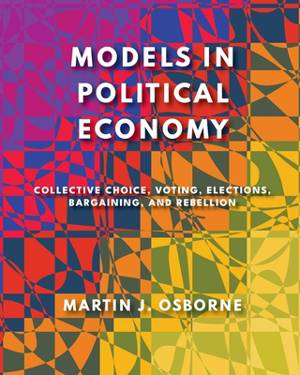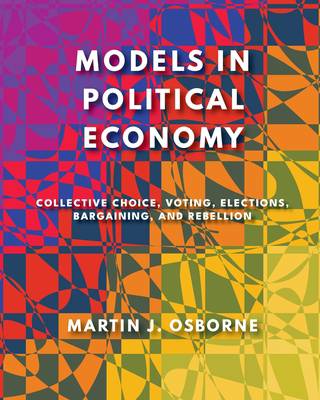
- Afhalen na 1 uur in een winkel met voorraad
- Gratis thuislevering in België vanaf € 30
- Ruim aanbod met 7 miljoen producten
- Afhalen na 1 uur in een winkel met voorraad
- Gratis thuislevering in België vanaf € 30
- Ruim aanbod met 7 miljoen producten
Zoeken
Models in Political Economy
Collective Choice, Voting, Elections, Bargaining, and Rebellion
Martin J Osborne
Paperback | Engels
€ 107,45
+ 214 punten
Uitvoering
Omschrijving
This volume explores topics that lie at the core of political economy: collective choice, voting, elections, bargaining, and rebellion. It presents the main formal models used to study the behavior of individuals and groups in political contexts, from choosing public policies and participating as voters and candidates in elections, to staging revolutions. Complete mathematical proofs are provided, to clarify the assumptions and deepen understanding.Part I presents models of collective choice. The main question is whether methods exist for selecting a reasonable compromise when individuals' preferences differ. Models of voting are studied in Part II. Included are models in which the individuals differ in their preferences as well as ones in which they differ in their information. One chapter considers the implications of individuals having ethical concerns, and another studies a model of sequential voting. Models of electoral competition, under the assumption of various motivations for the candidates, are discussed in Part III. One chapter is devoted to the application of these models to the study of redistributive policy. The book concludes with Part IV, which covers models of bargaining and rebellion.The book offers a rigorous yet accessible foundation for understanding how formal tools can illuminate political phenomena.
Specificaties
Betrokkenen
- Auteur(s):
- Uitgeverij:
Inhoud
- Aantal bladzijden:
- 554
- Taal:
- Engels
Eigenschappen
- Productcode (EAN):
- 9781805117063
- Verschijningsdatum:
- 12/09/2025
- Uitvoering:
- Paperback
- Formaat:
- Trade paperback (VS)
- Afmetingen:
- 203 mm x 254 mm
- Gewicht:
- 1460 g

Alleen bij Standaard Boekhandel
+ 214 punten op je klantenkaart van Standaard Boekhandel
Beoordelingen
We publiceren alleen reviews die voldoen aan de voorwaarden voor reviews. Bekijk onze voorwaarden voor reviews.







